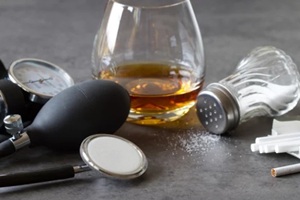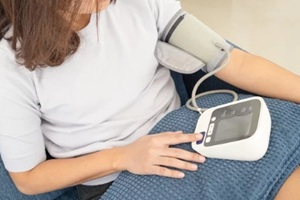 Keeping your blood pressure at healthy levels is important to minimize your risk of heart disease, stroke, and other complications. If you enjoy drinking alcohol, you may wonder how it impacts blood pressure and if cutting back could help improve your numbers. Read on to learn how alcohol influences hypertension, which drinking habits tend to be riskiest, and simple tips to drink less for better health.
Keeping your blood pressure at healthy levels is important to minimize your risk of heart disease, stroke, and other complications. If you enjoy drinking alcohol, you may wonder how it impacts blood pressure and if cutting back could help improve your numbers. Read on to learn how alcohol influences hypertension, which drinking habits tend to be riskiest, and simple tips to drink less for better health.
How Alcohol Affects Blood Pressure
When you drink alcohol, it affects your body in various ways, including possibly spiking your blood pressure. Here are some of the ways alcohol impacts your numbers:
- Increases stress hormones: Drinking triggers your adrenal glands to release higher quantities of adrenaline and cortisol. These stress hormones can interfere with blood pressure regulation.
- Alters kidney hormones: Alcohol influences kidney functions, causing fluctuations in hormones that control fluid balance and vascular tone. This can lead to fluid retention and narrowed blood vessels.
- Disturbs mineral balance: Alcohol throws off calcium levels throughout the body, making blood vessels clench rather than relax. It also causes a loss of magnesium, an important mineral for blood pressure control.
- Worsens sleep quality: Although alcohol can initially make some people fall asleep faster, it reduces restorative deep sleep and REM sleep later in the night and may increase sleep disruptions. Poor sleep is linked with elevated blood pressure.
- Contributes to weight gain: Those empty alcohol calories promote fat storage and obesity, an important risk factor for the onset of high blood pressure.
As you can see, alcohol impacts blood pressure levels through various mechanisms. Even small amounts may cause spikes, while regular heavy drinking can seriously endanger your heart health long-term.
The good news is that if you reduce how much alcohol you drink, you can improve your blood pressure numbers. According to experts, if someone who is considered a heavy drinker reduces the amount they drink to moderate levels, they can reduce their diastolic pressure (the bottom number) by around 4 millimeters of mercury (mm Hg) and their systolic pressure (the top number) by about 5.5 mm Hg. This change can significantly improve cardiac health.
Why Drinking Patterns Matter
More than just your total weekly alcohol intake, your patterns of drinking can have a big influence on blood pressure. Occasional moderate drinking may only cause temporary blood pressure spikes. However, frequent binge drinking or heavy daily drinking can dramatically increase your risk of developing hypertension over time.
Moderate drinking reflects up to 1 drink per day for women and 2 for men, sipped slowly so blood alcohol doesn’t spike. This generally causes minimal blood pressure fluctuations.
 Binge drinking means having four or more drinks within two hours for women and five or more for men. These rapid, excessive alcohol spikes put great strain on blood vessels.
Binge drinking means having four or more drinks within two hours for women and five or more for men. These rapid, excessive alcohol spikes put great strain on blood vessels.
Heavy drinking indicates more than three drinks per day or seven weekly for women and four daily or 14 weekly for men. These ongoing high alcohol levels seriously deteriorate cardiovascular function.
As you cut back on drinking, reducing the intensity of each episode is just as important as decreasing total amounts. Prioritizing mindful, moderate habits better supports healthy blood pressure.
Tips for Cutting Back on Alcohol
If you are wondering where you should start to adopt better drinking habits, consider this mix of lifestyle tweaks and smart strategies:
Stay Hydrated
When you’re sipping on water, herbal tea, seltzer, or other no- or low-calorie drinks throughout the day, you’ll naturally end up drinking less alcohol. Try to get at least 64 ounces of water and other fluids daily. Not only does hydration help minimize next-day hangovers, but staying hydrated may also help gently flush toxins and reduce any bloating related to drinking.
Limit Yourself to 1-2 Drink Days
Rather than trying to cut out alcohol completely, allow yourself to fully enjoy one or two drinks on designated days per week. Avoid falling into the habit of drinking every single night of the week, which poses the greatest risk for high blood pressure and related issues over time.
Eat Well Before and While Drinking
Consuming a balanced meal with healthy fats, lean protein, and high-fiber carbohydrates about an hour before you start drinking helps slow down the body’s alcohol absorption rate so you don’t overdo it. Snacking on similar snacks while sipping cocktails also helps minimize tipsiness and supports moderation.
Set Goals and Track Your Progress
Clearly define what cutting back on drinking means to you, such as, perhaps, aiming to slash your drinking days in half each week. Download a sobriety tracking app or purchase a printed tracker to monitor successes and keep yourself accountable as you work towards your goals.
Carry a Tracker Card
Small pocket-sized drink tracker cards can help discretely tally the number of cocktails, glasses of wine, or beers you consume while out in social settings. This makes it easier to honor the limits you’ve set for yourself and avoid underestimating your intake.
Find New Social Hobbies
Look for enjoyable alcohol-free activities to fill your non-drinking nights, which will make it easier to cut back without feeling as if you’re missing out. Take up a new sport, volunteer for a cause you care about, or join a running group or book club. Having social events and hobbies spread throughout your week minimizes the temptation to overdrink out of boredom or habit.
Sip Mocktails or Dilute Drinks
Order a fizzy mocktail made with sparkling water, fruit juice, and herbs, or ask the bartender to create a “virgin” version of any cocktail. That lets you feel part of the fun while consuming less alcohol. Zero-proof beers and dealcoholized wines offer more options for social drinking minus the alcohol. Or simply add extra ice and soda water to alcoholic drinks to help slow your pace and cut the strength.
Talk to Your Doctor
 If you have high blood pressure or other medical issues impacted by alcohol, get personalized advice from your healthcare provider on healthy limits for your lifestyle and health status. Be honest about your current drinking habits so they can actually help you. If you believe you might have an issue with alcohol abuse, also ask for referrals to treatment programs.
If you have high blood pressure or other medical issues impacted by alcohol, get personalized advice from your healthcare provider on healthy limits for your lifestyle and health status. Be honest about your current drinking habits so they can actually help you. If you believe you might have an issue with alcohol abuse, also ask for referrals to treatment programs.
Prevent Hypertension with Imperial Center Family Medicine
If you have elevated blood pressure or concerns about your heart health, Imperial Center Family Medicine’s compassionate providers offer counseling and treatment plans personalized to your specific needs. Contact us today at 919-873-4437 or online to discuss lifestyle changes, medication options, and holistic therapies that can get your numbers headed in the right direction.
